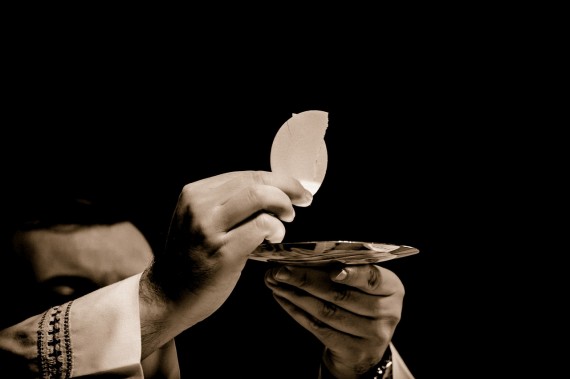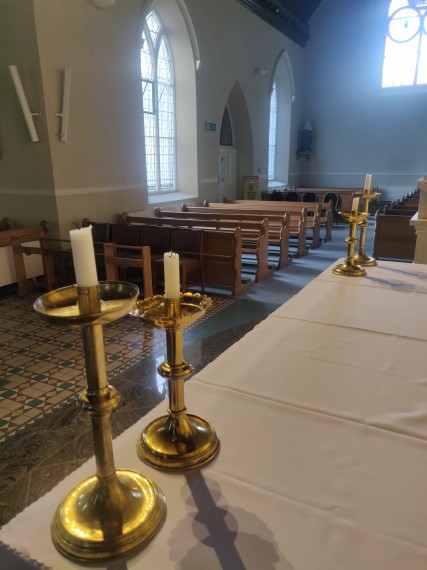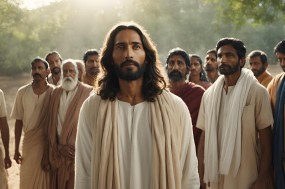Pastor’s Page
Welcome to the “Pastor’s Page”.
Hello! Fr. Damien here. I hope to use this page to elaborate a little, expand a little on whatever seems appropriate at the time (broad I know!) Sometimes this will involve expanding on something I mention in a homily that doesn’t quite “fit” into the Mass of that day. It may also involve explaining a decision I’ve taken that affects the life of the parish in more detail than I can in a few lines in the bulletin or on the parish Facebook page. At times, it will also be an opportunity for me to share something I’ve learned about the truth, beauty and goodness of our Catholic faith, with the hope that it might also inspire / encourage / help you! It will also be a way that I can answer some of the questions I get about our faith, the liturgy, Scripture, etc.
I won’t always get everything right here but I will try (and I will go back and correct where necessary ![]() )
)
Let’s see where this journey takes us…
Fr. Damien
—————————————————————————————————————————————————-
Copyright Permissions in Our Parish
(Posted by Fr. Damien, January 8th, 2025)
Further to direction from our Archdiocese, the parish has now subscribed to an annual licence with “One Licence.” This allows the parish to obtain permissions for the use of copyrighted music for our choir and soloists – and congregation – to sing. This is particularly important as we broadcast all of our Masses and liturgies via our livestream on YouTube. It also helps ensure that composers, authors, and publishers are compensated fairly for their work.
The annual cost of the licence to the parish is €649.44 and the parish has been operating under the licence since mid November 2024. It includes ensuring the hymns we use are coverd by the licence and reporting the hymns we use each week to “One Licence”.
A hymn or piece of music is covered for use by this license if:
• The copyright holder / Member Publisher is a part of the license service.
• The song is listed in the license catalogue.
• The song is approved for the specific license our parish holds.
Hymns or pieces of music not covered by the licence the parish holds, or which are not in “public domain”, cannot be used in any Masses (including Funeral Masses, Wedding Masses, etc.) or any other liturgies, in part because it would put the parish at risk of significant fines if non-licensed hymns or music were to be used.
This is obviously a new development for parishes and I will post further updates here as I learn more about how the licencing works.
Pro Populo Masses
(Posted by Fr. Damien, November 27th, 2024)
I’ve been asked what the “Pro Populo” Mass intention is that appears in the parish bulletin every week.
“Pro Populo” is Latin for “For the People”. Pro Populo Masses are Masses offered by the parish priest of a parish for the people entrusted to his care. It’s an obligation in the Canon Law of the Church which states in canon 534:
After a pastor has taken possession of his parish, he is obliged to apply a Mass for the people entrusted to him on each Sunday and holy day of obligation in his diocese. If he is legitimately impeded from this celebration, however, he is to apply it on the same days through another or on other days himself.
So I am called to celebrate Mass once a week for the people of the parish I serve – and ideally on Sundays. Sundays can be difficult as there are usually other Mass intentions I’ve been asked to include on Sundays. I can transfer the “Pro Populo” Mass to another day and you’ll often see it for one of the daily Masses. It can’t be shared with any other Mass intention nor do I take a stipend for it.
The Pro Populo Mass is offered by me for you, the people of the parish I serve.
——————————————————————————————————————————————–
Update Re Floor in St. Finian’s Church, Dromin
(Posted by Fr. Damien, October 30th, 2024)
As you may be aware, part of the floor in Dromin Church has become quite “spongy” to walk on. The issue has been traced to timber floor joists that are rotten and no longer able to support the weight of people walking on them. On behalf of the parish, I have sought a quote for repairs to be done. I have applied through the Irish Bishops’ Conference for a partial grant to help offset what will be a considerable cost.
As the church is a protected building, I am also in the process of submitting a “Request for Section 57 Declaration” to Louth County Council to inform them of the proposed works.
The section of the floor affected will remain sealed off until such time as the proposed repairs are completed.
——————————————————————————————————————————————————-
Mark – A Master of Words – Part II
(Posted by Fr. Damien, October 21st 2024)
Sometimes you learn something about part of Mark’s Gospel, a part that you thought you knew so well, that it blows your mind – well ok, it blew my mind!
In the Gospel of Mark, chapter 15, we find ourselves at the foot of the Cross on Good Friday – a scene we all know so well. Verse 37 tell us that Jesus gave a loud cry and breathed his last…Then verse 38 gives us what may seem an insignificant detail but, as I said before, Mark packs a punch with every detail.
In verse 38, we’re told that the curtain of the temple was torn in two, from top to bottom. That curtain was a massive curtain that hung from ceiling to floor, a curtain that separated the people from the Holy of Holies in the Temple, the place where God dwelled for them. Only once a year would the high priest be allowed to go through that curtain and into the presence of God Himself.
And here at the death of Jesus we find the Temple curtain torn in two, from top to bottom. So large was that curtain that tearing it in two from top to bottom could not be done by human hands…
By his death on the Cross, Jesus tore down the curtain, the barrier, between us and God. No longer would we be separated from God, no longer would the place where God dwells be inaccessible for us.
And all that in one line in Mark’s Gospel – just 14 words. But wait, there’s more…
Mark says that the curtain was “torn” in two, from top to bottom, pointing towards a divine hand at work. Where else does Mark uses that exact same word “torn” to show the divine hand at work? Go to chapter 1, verse 10 of Mark’s Gospel and read what happened to the heavens at that moment…
Mark – a master of words.
———————————————————————————————————————————————
Four Candles
Some may have noticed that last Sunday there were four candles on the altar for Mass. These remained in place for Mass on Monday morning and then we returned to having two candles on the altar for the rest of the week. Going forward there will be four candles on the altar for Sunday Masses.
I made this change after reading a paragraph in the “General Instruction of the Roman Missal” (GIRM), the official document from the Church explaining how Mass is to be celebrated. It can be found at the beginning of the Roman Missal and is easily found online. Paragraph 117 of the GIRM states that:
“…on or next to the altar are to be placed candlesticks with lighted candles: at least two in any celebration, or even four or six, especially for a Sunday Mass or a holy day of obligation.”
So the Church allows for additional candles for a Sunday Mass. Sunday Mass is already given a special prominence through the use of the Gloria, an additional Reading as opposed to a weekday Mass, saying the Creed, etc. Having four candles helps reinforce the prominence and uniqueness of Sunday Mass.
Lit candles are very symbolic in our liturgies, “both of Christ who declared himself ‘the light of the world’ (John 8:12 and 9:5), as well as his followers called to be ‘the light of the world’ (Matt 5:14), and presented a lighted candle at Baptism.” (Foley, Mitchell & Pierce (eds.), A Commentary of on the GIRM, Liturgical Press, Minnesota, 2007).
They remained in place for Monday Mass as we expose the Blessed Sacrament after Mass on Monday mornings and it is appropriate that Exposition includes lighted candles. The use of the same candles hopefully serves to highlight the connection between Mass and Exposition.
Fr. Damien
21st September 2024
——————————————————————————————————————————————————
Mark – A Master of Words
(posted September 9th 2024 by Fr. Damien)
Hand on heart, I’ve a very special place in my heart for the Gospel of Mark. It’s the first Gospel we studied in seminary and I was (and still am) blown away by how much Mark packs into what is the shortest of the four Gospels. Every word seems to be there for a reason, every sentence carefully chosen. And we have a couple of great examples of this in our Gospel reading at Mass yesterday (Twenty Third Sunday in Ordinary Time, Year B, Mark 7:31-37).
In our Gospel yesterday, Mark says that the crowd’s admiration for Jesus was unbounded. “He has done all things well.” Who else in Scripture has done all things well? Back at the beginning, in Genesis 1:31, we read that “God saw all that he had made, and indeed it was very good.” God did all things well, Jesus does all things well. By choosing a few well-known words, Mark points towards who Jesus really is.
In yesterday’s Gospel, we also hear about the deaf man who had a speech impediment. In the Greek that the Gospel was first written in, the word for that speech impediment is mogilalos. Apparently, there’s only one other place in the whole of the Bible where that word is used – in the prophecy of the coming of God in the Book of the Prophet Isaiah we heard in our First Reading yesterday (Is. 35:4-7) – “…and the tongues of the dumb sing for joy.” Tongues of the dumb = mogilalos. Isaiah prophecies that God will come and loosen the tongues of the dumb. Jesus comes and loosens the tongue of the deaf man who had a speech impediment. Again, Mark points towards who Jesus really is.
In fact, the whole of Mark’s Gospel is about who Jesus really is. Look at the very first line of Mark’s Gospel (Mark 1:1) – “The beginning of the Good News about Jesus Christ, the Son of God.” From the very outset, Mark makes it clear who Jesus is. In a way, he then spends the rest of the Gospel showing that Jesus is indeed the Son of God.
Fast forward to near the end of the Gospel where we find the centurion at the foot of the cross saying, “In truth this man was a son of God.” (Mark 15:39). Mission accomplished. Even a Gentile, Roman soldier now gets it. Mark begins and ends his Gospel with stating who Jesus really is.
In next Sunday’s Gospel from Mark (8:27-35), Jesus will ask his disciples, “But you, who do you say I am?” I’d imagine Mark would say he’s given us everything we need so we can answer that question for ourselves…
(All Scripture quotations from the Study Edition of Lectionary I Proper of Seasons, Sundays in Ordinary Time, Harper Collins, 1982)
——————————————————————————————————————————————————
Change in Date of the Annual Mass of Remembrance for All the Faithful Departed
(posted September 3rd, 2024 by Fr. Damien)
This year’s Annual Mass of Remembrance will be celebrated on Friday November 29th at 7.30pm in St. Brigid’s Church. I realise that’s a change from last year when it was celebrated at the Vigil Mass on the first Sunday in November. I just want to take a few moments to explain why I’ve changed it this year to later in the month of November.
In the calendar of the Church, Sunday rightly takes precedence over (almost) all other celebrations. It is a solemnity and every regular Mass celebrated on a Sunday (including the Saturday evening Vigil Mass) must use the Prayers and Readings of that Sunday. The liturgical calendar book even states that on Sundays, no Masses for the Dead are permitted.
When the Annual Mass of Remembrance was celebrated last year at the Vigil Mass on the first Sunday of November (in 2023, this was November 4th, the Thirty First Sunday in Ordinary Time), the Prayers and Readings for that Mass had to come from the Mass for the Thirty First Sunday, and not from the Masses for the Dead.
I think we lose something of the poignancy and richness of the Mass of Remembrance when we do that. The Church has a rich selection of Readings and Mass texts (and hymns) for Masses for the Dead which could be used when they can be. In addition, at the start of every November, we already celebrate the major commemoration of all the faithful departed – All Souls’ Day. “In November, We Remember” has become prominent in recent years and so it seemed to me more fitting to “bookend” the month of November with two celebrations where we remember and commemorate our faithful departed – All Souls’ Day at the start of the month and the Annual Mass of Remembrance at the end of the month.
———————————————————————————————————————————————————







